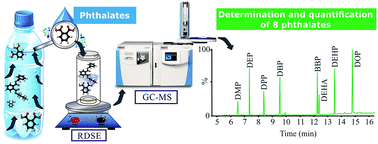Rotating-disk sorptive extraction coupled to gas chromatography mass spectrometry for the determination of phthalates in bottled water†
Abstract
The determination of eight phthalates in plastic bottled water, namely, dimethyl phthalate, diethyl phthalate, dipropyl phthalate, dibutyl phthalate, benzyl butyl phthalate, 2-ethylhexyl adipate, 2-ethylhexyl phthalate, and di-n-octyl phthalate, was carried out for the first time using a green extraction/preconcentration technology by rotating disk sorptive extraction (RDSE) and gas chromatography-mass spectrometry. The detection limits and precision (% RSD) were in the ranges 0.01–0.04 μg L−1 and 1–16%, respectively, for all the analytes. Absolute recoveries were in the range of 73 to 100% with the only exception being di-propyl phthalate (DPP, 57%), which were satisfactory considering that RDSE is an equilibrium based extraction technique. The applicability of this methodology was confirmed through the analysis of two types of Chilean commercial plastic bottled waters where five of the eight studied phthalates were quantified. This method is significantly faster than its counterpart by stir bar sorptive extraction (SBSE) and requires a considerably lower volume of the sample and solvent than SBSE; therefore it is an excellent green analytical methodology.



 Please wait while we load your content...
Please wait while we load your content...